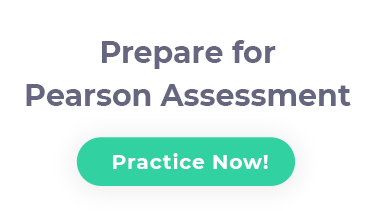Pearson Aptitude Tests Online Preparation [2025]

What Are Pearson Aptitude Tests?
Pearson is a well-known education company that provides a variety of educational services and products, including testing and assessment services. Pearson Aptitude tests are designed to assess an individual’s cognitive abilities, skills, and potential in various areas. Here is some general information about the assessments:
- Purpose: Pearson Aptitude tests are typically used by employers, educational institutions, and organizations to evaluate a candidate’s suitability for a particular job, program, or task. These tests aim to measure cognitive abilities, problem-solving skills, and other relevant aptitudes.
- Types of Tests: Pearson may offer a variety of aptitude tests tailored for different purposes. These could include numerical reasoning tests, verbal reasoning tests, abstract reasoning tests, and situational judgment tests, among others.
- Format: The format of Pearson Aptitude tests can vary. Some may be conducted online, while others may be administered in person. The exams may be timed, and the questions are structured to assess specific cognitive abilities.
- Scoring and Results: Pearson Aptitude tests typically provide a score that reflects an individual’s performance in comparison to a normative group. The results help employers or institutions make informed decisions about the candidates.
- Industry-Specific Test: Pearson may offer industry-specific aptitude tests tailored to specific professions or sectors. For example, there might be tests designed for finance, technology, healthcare, or other industries.
Pearson Aptitude Tests:
Pearson offers a wide variety of aptitude tests, but here are a few of the big ones:
- Watson-Glaser Critical Thinking Appraisal:
Purpose: The Watson-Glaser test is designed to assess critical thinking skills. Critical thinking is the ability to analyze and evaluate information, draw logical inferences, and form well-reasoned conclusions.
Components: The test typically consists of multiple-choice questions divided into different sub-sections, each targeting specific aspects of critical thinking, such as inference, deduction, interpretation, and evaluation of arguments.
Usage: Employers often use the Watson-Glaser test in the recruitment process, especially for roles that require strong analytical and decision-making skills.
- Bennett Mechanical Comprehension Test (BMCT):
Purpose: The BMCT is an aptitude test that evaluates a person’s understanding of basic mechanical principles. It assesses the ability to comprehend and apply concepts related to mechanical reasoning.
Content: Questions in the BMCT may involve understanding the principles of gears, levers, pulleys, and other mechanical components.
- Analogical Reasoning Appraisal (ANRA) Test:
Purpose: The ANRA test evaluates analogical reasoning skills. Analogical reasoning involves recognizing relationships and patterns between words, ideas, or figures and applying these relationships to solve problems or answer questions.
Structure: The ANRA test typically presents pairs of words or figures and requires candidates to identify the relationship between them. Candidates must then apply the recognized association to choose the most appropriate pair from a set of options.
Applications: Analogical reasoning is relevant in roles where the ability to identify and apply patterns is essential, such as problem-solving in various professional settings.
- DAT—Differential Aptitude Tests Preparation:
Purpose: The DAT is a series of aptitude tests designed to measure a person’s specific cognitive abilities. The tests cover various domains, including verbal reasoning, numerical reasoning, abstract reasoning, mechanical reasoning, and more.
Usage: Common in education for student placement and career counseling. Employers may use it for job role assessments.
- Standard Pre-Employment Aptitude Tests:
Purpose: These refer to different types of aptitude tests that assess specific cognitive skills.
Verbal Reasoning: Assesses the ability to understand and evaluate written information.
Numerical Reasoning: Tests mathematical skills and the ability to work with numerical data.
Mechanical Reasoning: Evaluates understanding of basic mechanical concepts and principles.
Abstract Reasoning: Measures the ability to identify patterns, relationships, and logical sequences in non-verbal information.
Industries that Use Pearson Aptitude Tests
Many companies across various industries use aptitude tests, including those provided by Pearson. The specific psychometric tests and their usage can vary based on the industry, job requirements, and organizational preferences. Here are examples of industries and types of companies that commonly use Pearson Aptitude tests:
- Technology and IT Companies
- Financial Institutions
- Consulting Firms
- Engineering and Manufacturing Companies
- Healthcare Organizations
- Government Agencies
- Retail and Consumer Goods
- Educational Institutions
- Human Resources and Recruitment Agencies
- Aerospace and Defense Contractors
How to Prepare for Pearson’s Aptitude Tests?
When preparing for the Pearson Aptitude tests, focus on understanding the types of questions asked, developing strategies for efficient problem-solving, and addressing any identified areas of weakness. Use practice tests that have example questions and detailed answers to help you review for the exam. It’s important to note that practice tests for these assessments are designed to help individuals become familiar with the question formats and improve performance. Understanding the specific components and objectives of these tests can help individuals prepare more effectively. It’s essential to review sample questions, practice under timed conditions, and focus on strengthening identified areas of weakness in order to earn a high score on the Pearson Aptitude tests.

